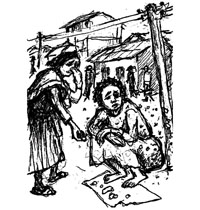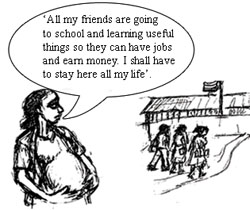Early marriage
Early marriage is a common practice in many regions, particularly in rural communities where it is thought to ensure virginity. Parents often wish to see their daughters married and to see grandchildren before they die. People also practise early marriage for traditional reasons. If a girl is not married at an early age, other members of the community may think she must be too unattractive or ill-behaved to get a husband. This attitude usually causes shame to both the girl and her family.
Early marriage happens when the young adolescent or preadolescent girl is not ready, physically and psychologically, for intercourse, pregnancy, or childbearing and rearing.
I hate early marriage. I was married at an early age and my in-laws forced me to sleep with my husband and he made me suffer all night. After that, whenever day becomes night, I get worried thinking that it will be like that. This is what I hate most. (UNFPA, State of World Population 2005)
This quote from a girl, aged 11, married at age five shows the long-term psychological damage caused by early marriage. Now read the case study below, which describes the problems another young girl had because of early marriage.
Case study: Emebet
Emebet is a 15-year-old girl who got married in a rural village to Tola, a 24-yearold. Following her marriage she became pregnant. However, she was not fully grown herself and had a very prolonged labour. After three days labour with no health professional to assist her, the baby was stillborn. She became incontinent (unable to control her urine) due to a fistula (a hole that formed in the wall of the vagina communicating with the bladder).
A few days later Emebet was taken to a hospital where she was able to get medical care, but she was told that her condition needed prolonged treatment and follow-up in the hospital. As a result she was forced to live confined to her house for a long time.
In the meantime, her husband left her and married another young woman from the same village. Emebet was very sad when she realised that it would be very difficult to remarry in her present situation.

Obstetric fistula
Obstetric fistula is a condition in which a woman continuously leaks urine and/or faeces, which often follows prolonged obstructed labour. An obstetric fistula is a hole or a defect that forms in the wall of the vagina communicating with the bladder (vesico-vaginal fistula) or with the rectum (recto-vaginal fistula) as a result of obstructed labour. A fistula is created when the vaginal tissues are crushed between the bony plates formed by the fetal head and the pelvic bones for prolonged periods of time. Obstetric fistula is more common among young women as they are likely to have prolonged and obstructed labour because of their underdeveloped pelvis.
Because of the constant leakage of urine and/or faeces, and frequent urinary tract infections, victims of fistula have a terrible odour, which is one of the reasons why their communities isolate them.
Fistula victims suffer profound psychological trauma resulting from their complete loss of status and dignity. The majority of women who develop fistulas are abandoned by their husbands because of their inability to have children. Facing familial and social rejection and unable to make a living by themselves, the women who develop fistula live for years without any financial or social support. Many fall into extreme poverty.
If you encounter a young woman suffering from such condition, you need to refer her to a hospital where the fistula can be repaired.
Early marriage is associated with many health and social consequences. These include:
Health impacts of early marriage:
- Early pregnancy, which may lead to nutritional deficiencies for the mother and child
- Increased risk of death due to pregnancy-related causes
- Risks to baby include premature birth, low birth weight (reflecting poor nutritional status), fetal loss, and neonatal mortality (death of the newborn within the first 28 days of life)
- Vaginal tear and fistula
- Sexual abuse
- Young married girls are less likely to participate in decision making.

Social impacts of early marriage:
- Disrupts life of the victim
- Limited opportunity for education and employment
- Higher likelihood of broken marriage
- Rural-urban migration (which may predispose them to prostitution, STIs, HIV and AIDS)
- Stigma, and low self-esteem.